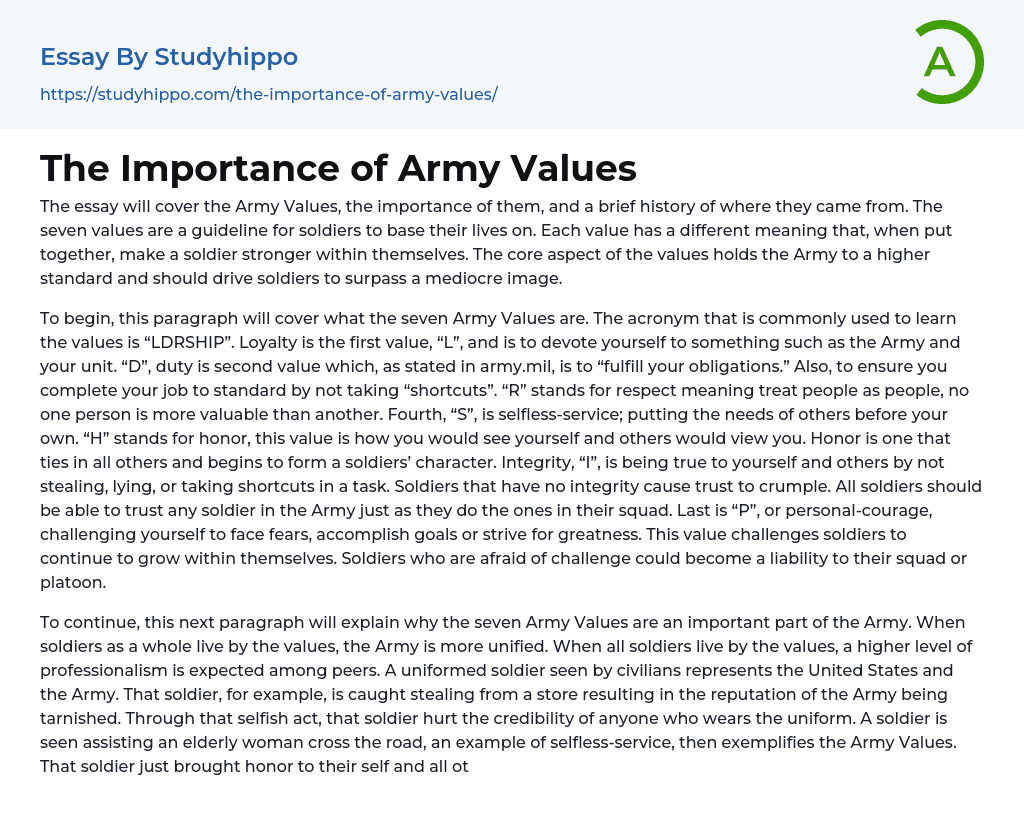The essay will cover the Army Values, the importance of them, and a brief history of where they came from. The seven values are a guideline for soldiers to base their lives on. Each value has a different meaning that, when put together, make a soldier stronger within themselves. The core aspect of the values holds the Army to a higher standard and should drive soldiers to surpass a mediocre image.
To begin, this paragraph will cover what the seven Army Values are. The acronym that is commonly used to learn the values is “LDRSHIP”. Loyalty is the first value, “L”, and is to devote yourself to something such as the Army and your unit. “D”, duty is second value which, as stated in army.mil, is to “fulfill your obligations.” Also, to ensure you complete your job to standard by not takin
...g “shortcuts”. “R” stands for respect meaning treat people as people, no one person is more valuable than another. Fourth, “S”, is selfless-service; putting the needs of others before your own. “H” stands for honor, this value is how you would see yourself and others would view you. Honor is one that ties in all others and begins to form a soldiers’ character. Integrity, “I”, is being true to yourself and others by not stealing, lying, or taking shortcuts in a task. Soldiers that have no integrity cause trust to crumple. All soldiers should be able to trust any soldier in the Army just as they do the ones in their squad. Last is “P”, or personal-courage, challenging yourself to face fears, accomplish goals or strive for greatness. This value challenges soldiers to continue to
grow within themselves. Soldiers who are afraid of challenge could become a liability to their squad or platoon.
To continue, this next paragraph will explain why the seven Army Values are an important part of the Army. When soldiers as a whole live by the values, the Army is more unified. When all soldiers live by the values, a higher level of professionalism is expected among peers. A uniformed soldier seen by civilians represents the United States and the Army. That soldier, for example, is caught stealing from a store resulting in the reputation of the Army being tarnished. Through that selfish act, that soldier hurt the credibility of anyone who wears the uniform. A soldier is seen assisting an elderly woman cross the road, an example of selfless-service, then exemplifies the Army Values. That soldier just brought honor to their self and all others in the military. A soldier must rely on peers in a combat situation. It is the soldiers’ duty to perform their job in any situation. If they fail to perform their duty the mission may be compromised. Even if the situation is in garrison, that soldier just failed their squad or platoon who now has cover the job. Respect is a value that is in place to keep soldiers humble. Soldiers must respect other soldiers in order to create an excepting and team building atmosphere. Respect of others privacy, personal belongs, and space is crucial to avoid conflict.
Finally, this paragraph will cover a brief history of the origins and evolution of the Army values. Since 1775 the Army has always tried to instill a set of values for the soldiers to
follow. The current 7 values the Army follows evolved from the early 1970s. An “Officers Creed” contained the original values: I want to selflessness, expertise, fairness, justice, dignity, candor, loyalty, Integrity, welfare of soldiers, physical and moral courage. In the 1980s, Army Training and Doctrine Command, Commanding General (TRADOC CG) Gen Donn A. Starry creates a doctrine. The doctrine states 4 values: candor, commitment, courage, and competence. Throughout the years the list of values would change as different leaders would take charge. New doctrines would be published, new values added, and some removed. Throughout those chances, the words would change but the “values” would stay the same. In 2005, an “Army Values Campaign Plan” was launched to revamp the Army Values and create the “LDRSHIP” acronym. This campaign continues to create new posters and display them throughout the Army common areas for all to see.
In conclusion, this essay covered what the 7 Army Values are, why and how they are important to the Army, and a brief history of how they came to be. When soldiers choose to live by the values, they honor the history of the Army. They honor the soldiers who fought before them. They honor the future of the Army.




